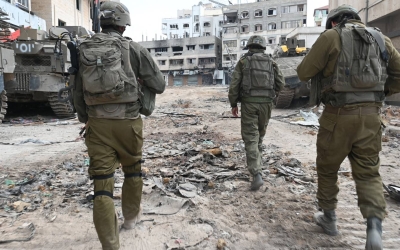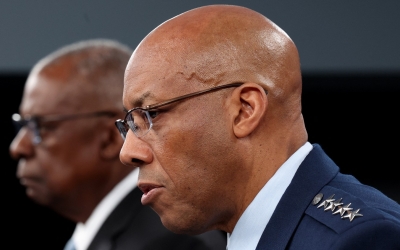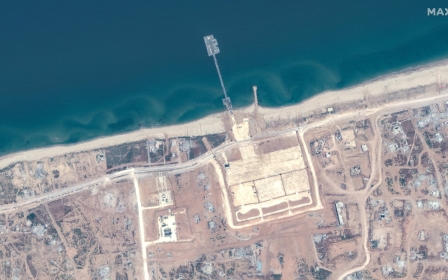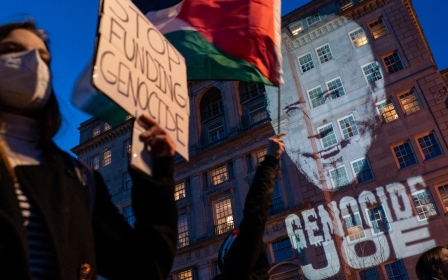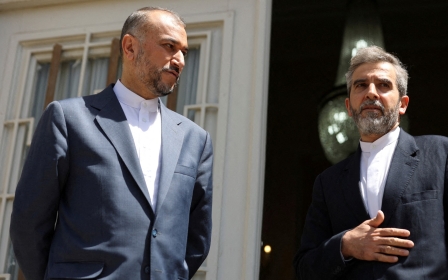Biden's approach to the war on Gaza highlights 'American fecklessness', say analysts
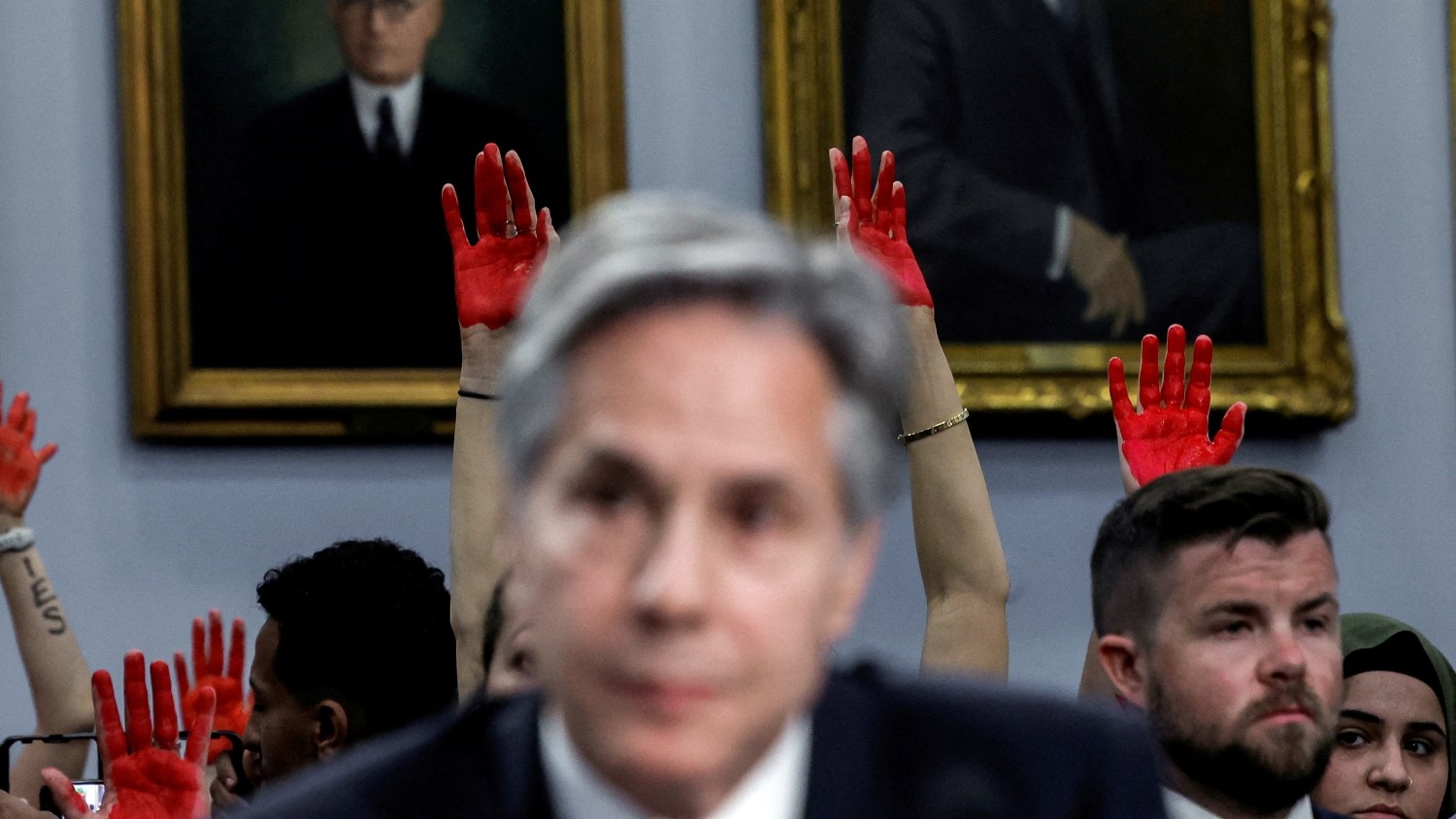
US President Joe Biden has failed to exert any real pressure on Israel over its brutal assault on Gaza, with the White House failing to address the dire humanitarian situation in the besieged and war-battered enclave, analysts have told Middle East Eye.
Earlier this week, US Secretary of State Antony Blinken told a congressional hearing that leaks to the media concerning frustrations over Israel's military conduct in Gaza should have never happened.
"It's deeply unfortunate that discussion was leaked to the press when it was a private discussion between us and Israel," he told the Senate Foreign Relations Committee on Tuesday.
"Leaks are an unfortunate part of the business that we're all engaged in. It's really regrettable, but it happens. But also, something that's not a leak is the fact that we've been both public and private about the fact that we have deep concerns about a major military operation in Rafah."
The congressional hearing highlighted a major discussion around the US-Israel relationship and the levers of pressure available to the Biden administration concerning Israel's military operations in Gaza.
Analysts told MEE that while the administration believes a capricious style of public and private messaging to Israeli officials will lead to decreases in civilian harm in Gaza, very little was changing on the ground
"I think they [the US] think there's pressure. This is President Biden's view of how the relationship should work, which is publicly pretty much total support and any differences are best kept private," Matt Duss, vice president of the Center for International Policy, told MEE.
"But real pressure is using the real tools of leverage that we have in this situation. If we really want to achieve a particular policy goal - in this case get Israel to stop killing so many civilians - then we can stop sending them the bombs ... which should absolutely not be used in these very densely populated urban areas. We should have started doing this months ago."
Since Israel declared war on Gaza after the 7 October attacks, the Biden administration has thrown its full diplomatic weight behind Israel while also speeding up arms shipments to the country as it began to prepare for a ground invasion of the enclave.
Over the past eight months, legal experts, rights groups, and Palestinians have all criticised the Biden administration's material support for Israel's war effort.
The support continued to flow to Israel despite documented cases in which Israeli forces targeted schools and residential buildings and laid siege to hospitals. So far, more than 35,000 Palestinians have been killed, most of whom are women and children, according to the Palestinian health ministry.
On Thursday alone, fifteen Palestinian children were killed in Israeli strikes.
The administration's State Department has also lost several officials, all of whom have resigned in protest against US support for Israel and its approach to the war.
In recent months, the administration publicly messaged it was opposed to an Israeli invasion of Rafah, the southernmost city in Gaza where hundreds of thousands of internally displaced Palestinians have sought refuge.
Still, despite public US opposition, the Israeli military earlier this month launched an assault on Rafah - and seized the crossing with Egypt used to bring aid in - at a time when mediators were sitting in Cairo attempting to work out a ceasefire.
The US response was then multi-tiered. On one hand, the administration paused a single arms shipment to Israel, framing it as a piece of leverage used against Israel to stop an invasion of Rafah. On the other hand, State Department spokesperson Matthew Miller told reporters that the Israeli operation was not the "full-scale" invasion that Washington was opposed to.
"In terms of Rafah, that's called saving face and giving the Israelis a carrot," Adam Weinstein, deputy director of the Middle East programme at the Quincy Institute for Responsible Statecraft, told Middle East Eye.
"Okay, fine, you took control of the crossing, you're setting the stage for a full-scale invasion, but you haven't gone through with it yet. So we're going to pat you on the back and say, well, at least you didn't do what you could have done."
Gaza pier: 'American ineffectiveness' at its finest
Outside of Israel's military operations in Gaza and its continued decimation of civilian life, Israel has also managed to block humanitarian aid from entering the Strip with minimal US pushback.
Rights groups and aid agencies alike have said that throughout the war, Israel has stopped trucks full of humanitarian aid from entering Gaza.
The UN's World Food Programme warned last week: "The threat of famine in Gaza never loomed larger."
A report from The Guardian newspaper on Tuesday found that Israeli security forces "are tipping off" far-right Israeli settlers to the location of trucks filled with humanitarian supplies en route to Gaza. Those leaks are allowing settlers to vandalise and block the aid shipments. Unrwa chief Philippe Lazarini on Thursday said Israeli authorities are "prioritising" the private sector at the main crossing point for goods.
However, the US issued a report on 10 May, in which it said that Israel likely breached international law using American weapons, but also concluded Israel was not hampering US aid to Gaza.
'A monument to American fecklessness, American ineffectiveness'
- Matt Duss, Center for International Policy
"We do not currently assess that the Israeli government is prohibiting or otherwise restricting the transport or delivery of US humanitarian assistance within the meaning of section 620I of the Foreign Assistance Act," the report stated.
Rather than pressuring Israel to allow more aid in, Washington has focused its humanitarian efforts on two fronts. One is the use of air-dropping supplies to Gaza, a method deemed ineffective and wholly inefficient by aid groups. Several Palestinians have also been killed by the air drops, either by being hit by them or by dying as a result of trying to reach the drops.
The second has been through the creation of a floating pier, which was touted as a means to accelerate assistance to the people of Gaza. That pier was finally completed last week at a cost of at least $320m.
As of Tuesday, the Pentagon said that none of the aid unloaded onto the pier has reached the broader Palestinian population in the area.
"A monument to American fecklessness, American ineffectiveness," Duss said about the floating pier.
"I'm not going to ever dismiss efforts to get more aid in, but it's a matter of why we need this pier at all. Everyone recognises it's because the Israeli military is blocking aid," he told MEE.
But Duss noted the pier continues to be the cornerstone of the American aid effort because Israel, "this American partner state, which is enormously reliant on American weapons and political and diplomatic support, is refusing to do the things that its patron has been asking it to do".
Israel squandering goodwill
Despite full-throated American support for Israel's war efforts, Israel has suffered major reputational damage throughout the international community.
The country is facing a case at the International Court of Justice, where South Africa is accusing the country of committing genocide against Palestinians. Turkey and Egypt recently joined in those efforts, while Turkey also halted trade with Israel.
Ireland, Spain, and Norway have all moved to recognise the state of Palestine. And a recent resolution at the United Nations General Assembly to increase membership rights to Palestine passed overwhelmingly - votes at the UN General Assembly cannot be vetoed by the US, unlike votes at the Security Council.
And in a surprise announcement, an International Criminal Court prosecutor announced he would issue arrest warrants for Israeli Prime Minister Benjamin Netanyahu and Defence Minister Yoav Gallant, in addition to three Hamas leaders.
The US has responded with this growing international criticism towards Israel's actions in Gaza, and towards the Palestinian population in general, with outright dismissal. In response to the ICC announcement, the Biden administration said issuing such arrest warrants would fail on jurisdictional grounds because neither Israel nor Palestine is a member of the court.
"Frankly, the US administration is hiding behind definitional technicalities and semantic acrobatics after nearly eight months of a vengeful war," Khalil Jahshan, a Palestinian-American political analyst and director of the Arab Center DC, wrote in an analysis published on Tuesday.
Jahshan noted that Israel's objective of "total victory" has been "deemed unlikely and impossible to achieve by most experts, including senior US and Israeli officials".
Weinstein told MEE that the current moment could prove even more concerning for the Palestinian population, given that the growing criticism and condemnation of Israel's actions could lead it to take even more drastic measures against the people of Gaza. And the US has failed to stop this.
"We're in a very dangerous moment in which Israeli leaders and Israeli society believe that the reputational damage that they have faced as a state in a society is so severe, and there's so much of a sunk cost that they might as well keep going," Weinstein said.
"What the Biden administration has failed to communicate to Israel's leaders and to the society writ large is that it can get worse if you don't change course. And it could get irreparably worse, and that they're squandering the goodwill of their allies and partners."
Middle East Eye propose une couverture et une analyse indépendantes et incomparables du Moyen-Orient, de l’Afrique du Nord et d’autres régions du monde. Pour en savoir plus sur la reprise de ce contenu et les frais qui s’appliquent, veuillez remplir ce formulaire [en anglais]. Pour en savoir plus sur MEE, cliquez ici [en anglais].


